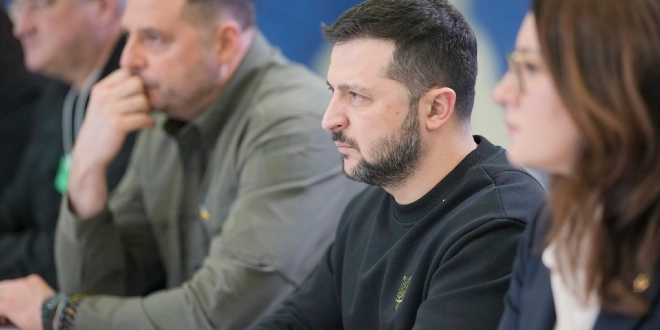At the World Economic Forum’s annual meeting in Davos, Switzerland, Ukrainian President Volodymyr Zelensky is taking center stage on the first full day, among other key figures from the U.S., E.U., China, and the Middle East. Amidst global focus on the Israel-Hamas conflict, Zelensky aims to draw renewed attention to Ukraine’s ongoing struggle against Russia.
The day’s agenda at the Davos conference center covers a wide range of topics, including European innovation, the economic implications of generative AI, clean technology support, and interest rate trends. Prominent discussions will include those with the prime ministers of Qatar and Jordan, as well as addresses by Chinese Premier Li Qiang, European Commission President Ursula von der Leyen, and U.S. National Security Adviser Jake Sullivan.
Zelensky, who had been hesitant to leave Ukraine during the war, has embarked on an international tour to bolster support, especially in light of worries about waning Western interest and the potential return of former U.S. President Donald Trump, known for his amicable stance towards Russian President Vladimir Putin, to the White House.
In Bern, Switzerland, Zelensky met President Viola Amherd, who committed to organizing a peace summit for Ukraine. In Davos, marking his first in-person appearance as president after previous virtual participations, Zelensky seeks to leverage the high-profile event to highlight Ukraine’s urgent needs. An exclusive morning session for CEOs, titled “CEOs for Ukraine,” will precede his speech, focusing on Ukraine’s immediate aid requirements and the role of the private and public sectors in its eventual reconstruction. Attendees include NATO leader Jens Stoltenberg, German Vice Chancellor Robert Habeck, and Penny Pritzker, the U.S. envoy for Ukraine’s economic recovery.
Later, key European allies of Ukraine, including Lithuanian President Gitanas Nauseda, Dutch Foreign Minister Hanke Bruins Slot, and Spanish Foreign Minister José Manuel Albares Bueno, will discuss Ukraine’s future prospects.
With “rebuilding trust” as its theme, the Davos meeting occurs amid growing global divides due to conflicts in the Middle East and Europe. Despite geopolitical challenges, there’s a sense of optimism in the business world, partly fueled by AI’s potential to enhance productivity. Stock markets have shown positive trends in 2023, and decreasing inflation has spurred hopes of interest rate reductions.
PwC’s 27th annual CEO survey reveals a doubled economic optimism among executives compared to the previous year, though long-term prospects remain uncertain. Challenges such as climate change and technological advancements like AI have led many executives to believe their companies need significant reinvention to remain viable over the next decade.
AI is a significant focus in Davos, with Microsoft CEO Satya Nadella, an investor in ChatGPT developer OpenAI, scheduled to speak on the topic.


